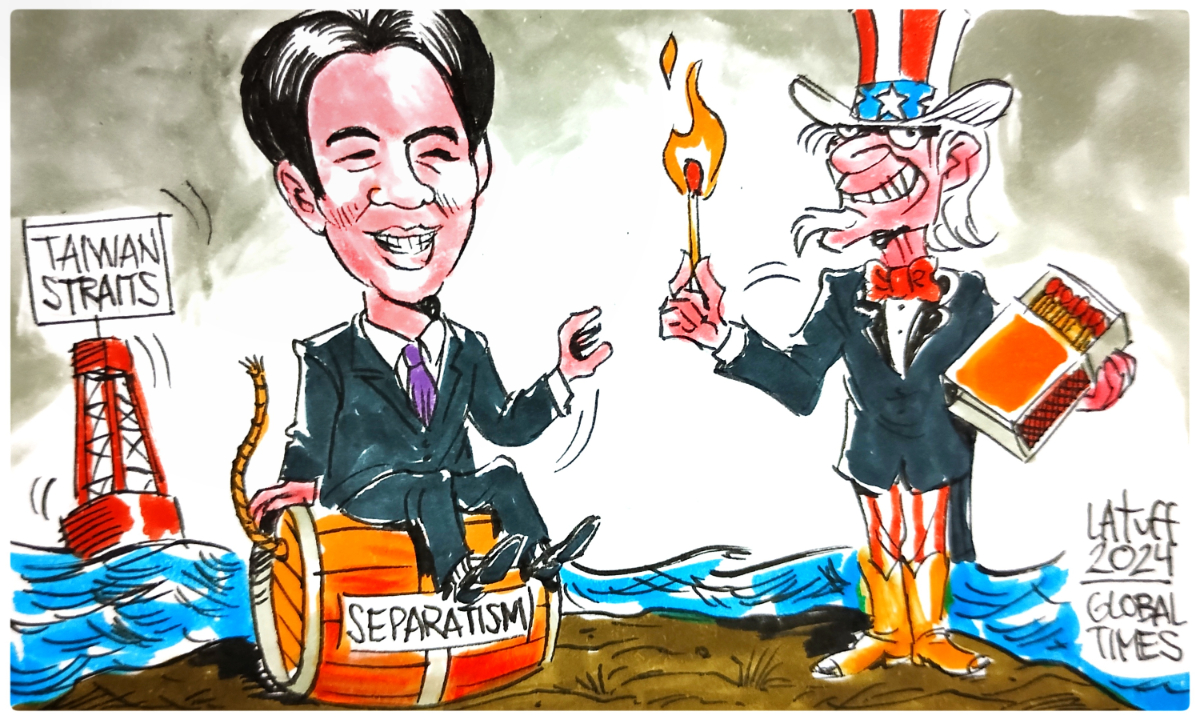
Condoning separatist forces means stocking flames in the Taiwan Straits. Cartoon:Carlos Latuff
A US congressional commission held a hearing on Thursday, claiming that the Chinese mainland is preparing for a potential conflict in the Taiwan Straits, possibly as early as next year. Analysts pointed out that this is a habitual move by the US to escalate regional tensions to serve its strategic interests against China and to find justifications for more collusion with "Taiwan independence" secessionists.
Analysts warned that as China-US relations head toward a more stable trend, the hype aimed at encouraging Taiwan secessionist authorities and meddling in the Taiwan question will not only undermine regional peace and stability, but also disrupt the established foundations of the two countries' diplomatic relations.
The US-China Economic and Security Review Commission (USCC) held a hearing on Thursday to examine whether China is preparing for a potential conflict in the Taiwan Straits. Citing several experts, the VOA report stated that China is preparing for a potential conflict in the straits and even a direct confrontation with the US, and emphasized the need for the US to enhance its monitoring of China.
The USCC has consistently served as a consulting agency for provoking discussions on China-related topics. Amplifying growing tensions with China aligns with US' interests in engaging in a more intense strategic competition with China, which includes readiness for potential involvement in a conflict in the Taiwan Straits, Lü Xiang, a research fellow at the Chinese Academy of Social Sciences, told the Global Times.
The US' consideration of involvement in a Taiwan Straits conflict exposes Washington as the real troublemaker that is always seeking ways to undermine regional peace and stability. In addition, it reflects the US' irresponsibility in maintaining a stable China-US relationship, the expert said.
The Taiwan question is the first red line that must not be crossed in China-US relations, Song Tao, head of both the Taiwan Work Office of the Communist Party of China Central Committee and the Taiwan Affairs Office of the State Council, told visiting co-chair of the Board of Trustees of the Asia Society John Thornton on Thursday.
Some 30 representatives from both China and the US, including Thornton, attended the Second China-US Track 1.5 Dialogue held in Beijing on Thursday. They agreed that both China and the US should adhere to peaceful coexistence, avoid conflicts and confrontations, and strengthen communication and dialogue to enhance mutual understanding and trust.
In talks with Thornton, Song also urged the US to be fully aware of the dangerous nature of the separatist attempts made by Taiwan's secessionist Democratic Progressive Party (DPP) authorities.
While China-US relations are stabilizing, the US continues to take risks for "Taiwan independence" secessionists and has never given up playing the Taiwan question as a card to thwart China's growth, Li Haidong, a professor at the China Foreign Affairs University, told the Global Times.
"The US cannot be trusted to keep its word. It is common knowledge that the US has recognized in the Three Joint Communiqués that there is only one China and Taiwan is part of it. Direct involvement in a Taiwan Straits conflict, as the USCC hyped, would entirely disrupt the established foundations of the two countries' diplomatic relations," Lü warned.
China strives to improve cross-Straits mutual understanding, and maintain peace and stability in the Taiwan Straits, ultimately achieving Taiwan reunification through peaceful means, but it also has to prepare for increased external interference, experts said.
Facing external provocations, including US politicians' encouragement to Taiwan secessionist authorities and their activities, the PLA is always prepared to fulfill its sacred duty of safeguarding national sovereignty and territorial integrity, Lü further noted.
The more aggressive "Taiwan Independence" separatists become, the faster they will end up destroying themselves, Defense Ministry spokesperson Zhang Xiaogang warned on Friday, following recent military activities and provocative remarks by the secessionists and armed forces on the island.
It was reported that Taiwan regional leader Lai Ching-te recently visited troops of the Hai Feng Shore-based Anti-ship Missile Group in eastern Taiwan, took pictures with a Hsiung Feng III missile vehicle and said that land forces would be used to counter PLA offenses from the sea. The head of Taiwan's military authorities said that troops in Taiwan would "exercise the right to self-defense" in the event PLA assets enter Taiwan's "12-nautical-mile airspace and territorial waters."
As Taiwan is part of China, how is it possible for Taiwan to have the so-called "right to self-defense"? Zhang asked.
He said the DPP authorities led by Lai Ching-te deliberately staged a political show to embolden itself, but such seemingly strong moves only reveal its internal weakness.
The PLA remains a strong force that will take resolute countermeasures against any provocations pushing for "Taiwan independence," said the spokesperson.




